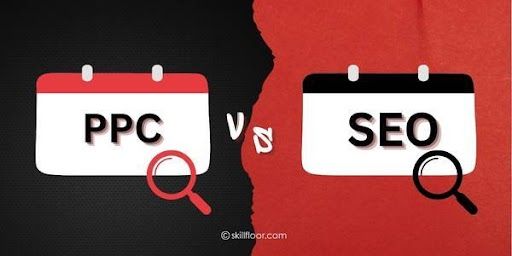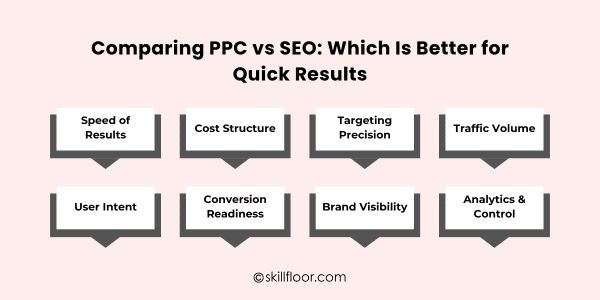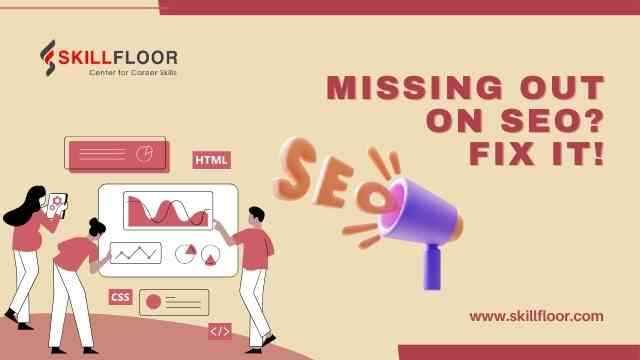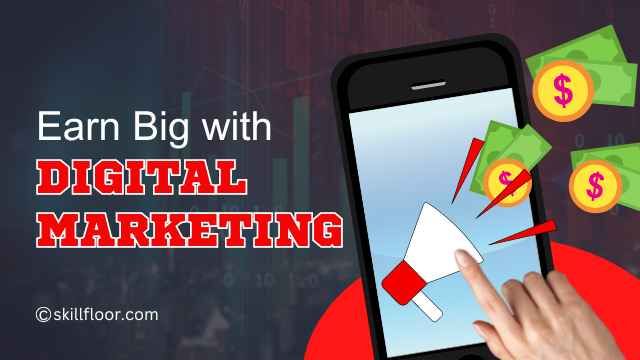PPC vs SEO: Which Is Better for Quick Results?
Explore the key differences between PPC and SEO to determine which strategy delivers faster results for your digital marketing goals.

Have you launched your website but noticed a slow rate of traffic? An attractive website is only the first step. You need the correct plan when you expect genuine traffic. That's where PPC and SEO are useful. While PPC uses paid advertising to provide quick results, SEO takes work but creates long-lasting development. Using one or a combination of both can help your business expand and get greater online visibility, depending on your goals and financial constraints.
The same question is frequently asked by company owners in places like Chennai and Coimbatore: how to attract traffic quickly. Everybody has a different answer. It depends on having a good plan. People may make better decisions and use tactics that have already proven effective by sharing practical examples rather than simply theoretical ones.
With so much advice available, growing online could be confusing. Only a well-thought-out approach can yield rapid results. SEO takes time to develop, PPC works quickly, and sometimes it's ideal to use both. It all depends on your timeframe and company objectives.
What Is PPC?
Pay-Per-Click is what PPC stands for. With this kind of internet advertising, you only have to pay when a user clicks on your advertisement. Frequently, these advertisements appear at the top of search results. It's a quick approach to get visitors to your website, particularly if you're just getting started.
PPC allows you to select business-related keywords. Your advertisement may show up when a user searches for such terms. Setting a daily budget will help you avoid going overboard. PPC is useful for testing offers, generating rapid traffic, and advertising bargains or events that have a time limit.
The Strategic Importance of PPC in Digital Marketing
-
Reach People Fast: PPC enables your company to quickly reach the right people. It is ideal for advertising deals, new goods, or services without having to wait months for results.
-
Control Your Budget: With PPC, you maintain financial control. Every click counts toward your growth since you can clearly track expenditure and set limitations, regardless of how big or little your business is.
-
Perfect Timing Works: Timing is critical in digital marketing. Because PPC enables you to target people while they are looking, you show up at the ideal time—when they are most likely to act or make a purchase.
-
Target The Right People: PPC reaches your ideal client with the correct configuration. You may target by time of day, region, or even interests to improve the effectiveness of your advertisements.
-
Track What Works: Clear data is provided by digital marketing solutions such as PPC. You can quickly test new concepts, evaluate which advertisements are effective, and modify strategies without spending time or money-making educated guesses.
-
Use With SEO: PPC complements other marketing strategies nicely. You may run advertising while improving the SEO of your website, which will bring you visitors right now and set up long-term outcomes.
How Does PPC Work?
-
Choose Right Keywords: Choose keywords first that match the search terms used by your clients. These keywords make your advertisements more visible when consumers search online for goods or services similar to yours.
-
Set Your Budget: PPC gives you financial control. Choose a daily or monthly spending plan based on your requirements. You can remain on top of your advertising expenses and avoid overspending in this way.
-
Create Your Ads: Create simple adverts with clear text. Add a brief message, an attention-grabbing headline, and a link to your website. Effective advertisements help customers immediately grasp what you have to offer.
-
Run the Campaign: Launch your ad as soon as everything is prepared. This phase of ppc advertising places your ad in front of internet searchers, assisting in the rapid and simple recognition of your company.
-
Pay for Clicks: Only when an ad is clicked that you have to pay. As a result, you are investing in actual visitors to your website rather than just views, increasing the likelihood that you will generate leads or purchases.
-
Track and Improve: View the results of your advertisement. You can see the number of clicks, as well as what succeeded and what didn't. By updating your campaign, you may improve upon it and achieve even greater outcomes in the future.
What Is SEO?
Search Engine Optimization is what SEO stands for. It entails making improvements to your website so that it appears when people search for your products on search engines like Google. Using the appropriate content, keywords, and structure can help your website show up naturally in search results; it's not about advertisements.
Over time, SEO helps people locate your website more easily. The approach is gradual yet effective in increasing traffic and fostering confidence. Higher page rankings brought forth by effective SEO allow more people to find your blog, services, or goods without having to pay for each click.
The Critical Role of SEO in Long-Term Digital Growth
-
Builds Steady Traffic: Over time, SEO helps your website receive consistent traffic. You receive steady development that lasts rather than short bursts, attracting individuals who are really interested in what you have to offer.
-
Improves Online Visibility: More people will view your website the higher it ranks. By ensuring that your company shows up when someone searches online, good SEO helps you connect with more prospective clients every day.
-
Increases Trust and Credibility: Websites that appear on the first page are trusted. By improving your site's reputation, SEO increases the likelihood that users will view you as a dependable and trustworthy choice.
-
Supports Long-Term Growth: Long-term outcomes are important when it comes to SEO importance. Even if you stop producing content for a while, SEO continues to drive fresh traffic, providing your company with long-term online strength.
-
Better User Experience: SEO improves user experience on your website in addition to search engine optimization. Clear design, quick loading times, and useful information keep users satisfied and entice them to come back.
-
Cost-Effective Marketing: Your pages will continue to drive traffic without charging you more once they rank well. SEO is a wise investment for long-term success because it doesn't cost each click as advertisements do.
How Does SEO Work?
-
Pick the Right Keywords: Selecting the right keywords is the first step in SEO. When someone puts in a topic or product connected to your business, these keywords help your website appear.
-
Write Helpful Content: The secret is to create information that is both easy to read and informative. Pages with clear answers to queries are shown by search engines such as Google. Visitors are more likely to stay on your site if it has high-quality content.
-
Make Pages Easy to Use: Your website should load quickly, be easy to use on mobile devices, and be easy to browse. A seamless and uncluttered experience keeps users satisfied and improves your site's search engine ranking.
-
Use Proper Headings and Links: Using connections to other sites and arranging material with clear headings are both components of good SEO. This makes it easier for consumers and search engines to comprehend the organization and content of your website.
-
Update Content Regularly: Relevant content is attractive to search engines. Regularly updating your blog, product pages, or service pages keeps your website fresh, boosts search engine rankings, and attracts users who are looking for new material.
-
Earn Quality Backlinks: Linking to your pages from other reliable websites indicates to search engines that your material is worthwhile. These backlinks increase traffic to your website and help you rank higher in search results.
Comparing PPC vs SEO: Which Is Better for Quick Results
1. Speed of Results
PPC: Fast and Immediate
PPC provides results quickly. Within hours after becoming live, your advertisement may show up in search results. Almost immediately, you will notice clicks and visitors, which makes it ideal for last-minute campaigns or product debuts.
SEO: Slow but Steady
Building SEO takes time. Search engines won't rank your website right away, even if it has excellent content. However, as your pages begin to rank, they provide steady, free traffic without requiring daily ad administration or investment.
2. Cost Structure
PPC: Pay Per Click
PPC requires you to pay each time an ad is clicked. Costs are determined by your competitors and keywords. Your budget is in your hands, but the traffic stops when you stop paying.
SEO: Long-Term Investment
Although SEO doesn't charge per click, it does require time, effort, and occasionally assistance from web specialists or content writers. Although the initial repairs may need some time, the traffic will continue to come in the future at no additional expense.
3. Targeting Precision
PPC: High Precision Targeting
With PPC, you can specify who sees your ad based on factors like location, device, time, or interest. Your message will reach the appropriate individuals at the right time, increasing the likelihood of success.
SEO: Broader Reach Over Time
Through the material that people look for, SEO reaches them. Though you have less control over time or audience, you may target by keywords and themes. It gradually increases awareness among a broader audience.
4. Traffic Volume
PPC: Instant but Limited
PPC may increase traffic quickly, but how much depends on your spending limit. The traffic ceases as soon as your daily or monthly ad expenditure is exhausted. It works well for brief spurts rather than continuous flow.
SEO: Slower but Lasting
Although SEO begins slowly, it eventually generates consistent and increasing traffic. Your content is excellent for long-term traffic growth since it may attract more visitors without incurring further costs as it ranks for more keywords.

5. User Intent
PPC: High Intent, Action-Ready
Clickers on PPC campaigns are frequently prepared to buy, phone, or register. Since these customers typically have defined goals in mind, they are more likely to convert fast.
SEO: Mix of Intent Levels
Different types of people are drawn to SEO, including those who are actively studying, comparing, and acting. While increasing knowledge and trust is a terrific idea, not all visitors will immediately convert.
6. Conversion Readiness
PPC: Ready to Convert Fast
PPC draws clients who are already considering making a purchase or taking action. They are more likely to make a purchase, join up, or inquire immediately after clicking the advertisement since they are clicking with intention.
SEO: Warmer, Slower Conversions
Some of the visitors brought in by SEO are ready, while others are merely perusing. Even though not everyone will act right away, quality content gradually builds trust and leads them to make a choice or convert in the future.
7. Brand Visibility
PPC: Instant Visibility Boost
PPC quickly elevates your company to the top. Your name shows up frequently even if people don't click, helping in rapidly building up brand awareness and drawing attention to your business during brief campaigns or launches.
SEO: Strong, Lasting Presence
Although it takes effort, SEO is worthwhile in the long run. People will see your brand more frequently in search results as your site ranks higher, which will automatically increase brand recognition and trust without requiring daily advertising.
8. Analytics & Control
PPC: Detailed Control and Tracking
PPC offers you complete campaign control. Real-time tracking of each click, expense, and outcome is possible. Changes are simple to test, and anything that doesn't work may be swiftly fixed.
SEO: Limited Control, Broader Insight
Although you can monitor user behavior, traffic, and rankings using SEO, you have less control over when your content appears in search results. Compared to PPC, results are slower to appear and changes take time.
When Should You Use PPC for Quick Wins?
-
New Product Launches: PPC is ideal for new product launches. It enables you to instantly attract attention, increase traffic, and test user reactions to your product from the very beginning.
-
Time-Sensitive Promotions: Having a sale or a temporary promotion? PPC is excellent for brief advertisements. You may contact individuals when your offer is still fresh and current since your adverts show up immediately.
-
Targeting Specific Locations: PPC enables you to target certain locations directly if your company caters to a city or local region. When it counts most, it drives locals to your website or business.
-
Testing New Services: Do you want to test a new service? To increase visitors and obtain quick feedback, use digital advertising such as PPC. It enables you to test without having to wait weeks for results.
-
Events or Webinars: Do you need people to sign up quickly for a webinar or event that is coming soon? PPC helps in its rapid promotion. Prior to the event, you can get in touch with those who are most likely to attend.
-
Beating Competition Quickly: PPC makes you stand out from the competition right away if your market is saturated. Your ad appears while consumers are looking, while others wait for SEO to take effect.
When Might SEO Still Be Worthwhile for Speed?
-
Low Competition Keywords: SEO might help you rank higher if there is less competition for your keywords or niche. Within a few weeks, your website could show up in search results with the correct information.
-
Existing Domain Authority: SEO adjustments are more effective if your website is older or has some credibility. You may rank pages quicker than a brand-new website since search engines react better to changes.
-
Strong Local Presence: Effective local SEO may produce benefits for local businesses very rapidly. By including Google Maps listings and location-based keywords, you may quickly attract local clients to your website.
-
Helpful Blog Content: Posting informative, well-written blog entries on popular or trending subjects might get traction quickly. Fresh material is frequently displayed higher by Google, particularly when it responds to well-known search queries.
-
On-Page Fixes: Occasionally, a few content or technological changes might quickly raise ranks. Without requiring months of work, SEO results may be accelerated by fixing mobile difficulties, page names, and keywords.
-
Supporting PPC Campaigns: PPC is a good fit for SEO. Strong content increases visitor conversions when you run adverts. Additionally, it sets up your website for future expansion once PPC is over.
Common Mistakes to Avoid
-
Ignoring Keyword Research: Poor results are the result of using wrong keywords. Not knowing what your audience searches for may cost you money, effort, and valuable content or advertisements, whether you're using PPC or SEO.
-
Skipping Landing Page Quality: If your landing page is poor, it is pointless to drive visitors. Verify that the website is easy to read, loads quickly, and fulfills the promise made in the advertisement or search result.
-
Setting Unrealistic Expectations: It's mistaken to expect SEO or PPC to bring you success overnight. PPC requires testing, and SEO takes patience. Remain focused and patient, and allow tactics time to produce results.
-
Not Tracking Performance: You won't know what's working if you don't track clicks, leads, or traffic. Frequent tracking enables you to identify problems early and enhance outcomes before using more energy.
-
Using the Same Strategy Always: Digital marketing is changing quickly. Perhaps what worked last year won't work now. Growth can be slowed down by sticking to an outdated approach without making adjustments or trying out novel concepts.
-
Ignoring Mobile Users: Many people use their phones to search. If your website isn't responsive, visitors can leave right away. Always make sure your sites, advertisements, and content display and function properly on mobile devices.
The goal of choosing between PPC and SEO is to understand what your company needs, not picking a winner. PPC might help your brand get noticed quickly if you're searching for immediate results. SEO provides a solid basis for long-term growth strategy. Often, it is preferable to use both at once. Each has advantages, and they may complement one another well if they are handled effectively. The secret is to align your plan with your budget, goals, and timetable. Whether you're looking for clicks today or customers tomorrow, you'll see actual results and consistent growth if you have the correct plan in place.































































